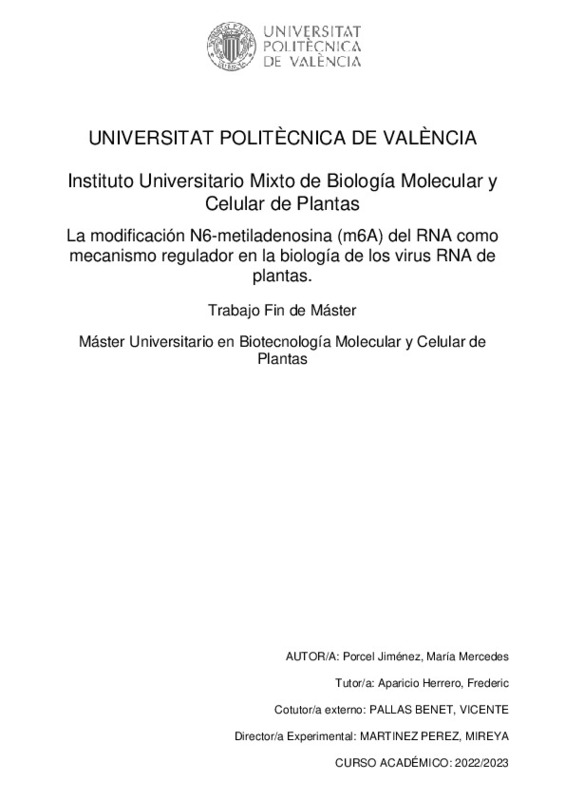JavaScript is disabled for your browser. Some features of this site may not work without it.
Buscar en RiuNet
Listar
Mi cuenta
Estadísticas
Ayuda RiuNet
Admin. UPV
La modificación N6-metiladenosina (m6A) del RNA como mecanismo regulador en la biología de los virus RNA de plantas.
Mostrar el registro sencillo del ítem
Ficheros en el ítem
| dc.contributor.advisor | Aparicio Herrero, Frederic
|
es_ES |
| dc.contributor.advisor | Pallás Benet, Vicente
|
es_ES |
| dc.contributor.advisor | Martínez Pérez, Mireya
|
es_ES |
| dc.contributor.author | Porcel Jiménez, María Mercedes
|
es_ES |
| dc.date.accessioned | 2023-02-13T09:15:42Z | |
| dc.date.available | 2023-02-13T09:15:42Z | |
| dc.date.created | 2023-01-27 | es_ES |
| dc.date.issued | 2023-02-13 | es_ES |
| dc.identifier.uri | http://hdl.handle.net/10251/191789 | |
| dc.description.abstract | [ES] La modificación N-6-metiladenosina (m6A) del RNA es la más abundante en mRNAs de eucariotas. Esta modificación está regulada por proteínas que incorporan el grupo metilo (metiltransferasas, conocidas como escritoras), proteínas que lo eliminan (desmetilasas, conocidas como borradoras) y proteínas que lo reconocen (conocidas como lectoras). La modificación m6A ejerce su función al ser reconocida por estas proteínas lectoras, que poseen un dominio de unión a m6A, y mediante la alteración indirecta de la estructura del RNA. En estudios recientes se ha puesto de manifiesto que esta modificación se realiza también sobre virus de RNA y que el estado de metilación del genoma viral repercute en gran medida sobre el ciclo infectivo del virus. Sin embargo, el conocimiento sobre los mecanismos de actuación de la maquinaria de m6A frente a infecciones virales en plantas son aún muy limitados. Entender la relevancia biológica de esta modificación sobre la patogenicidad, resultaría de gran importancia para permitir el desarrollo de estrategias de control de virus de plantas, dado que estos representan una grave amenaza para la economía y la seguridad alimentaria. Por lo tanto, en este Trabajo Final de Máster se ha pretendido ampliar el estudio de la modificación m6A en virus de plantas que no se habían analizado antes, como TRV, TCV y TuMV; también se ha comprobado si m6A es un mecanismo regulador universal y se ha estudiado el papel de las desmetilasas ALBKH9B, ALKBH10B y las proteínas lectoras ECT2/ECT5. Por último, se ha modificado una sección del genoma de AMV, insertando una etiqueta HA, para permitir su posterior detección y la identificación de nuevos factores que participen en la interacción virus-huésped. | es_ES |
| dc.description.abstract | [EN] The N-6-methyladenosine (m6A) modification of RNA is the most abundant in eukaryotic mRNAs. This modification is regulated by proteins that incorporate the methyl group (methyltransferases, known as writers), proteins that remove it (demethylases, known as erasers) and proteins that recognize it (known as readers). The m6A modification exerts its function by being recognized by these reader proteins, which possess an m6A-binding domain, and by indirectly altering the RNA structure. Recent studies have shown that this modification is also carried out on RNA viruses and that the methylation status of the viral genome has a major impact on the infectious cycle of the virus. However, knowledge about the mechanisms of action of the m6A machinery against viral infections in plants is still very limited. Understanding the biological relevance of this modification on pathogenicity would be of great importance to enable the development of plant virus control strategies, given that plant viruses represent a serious threat to the economy and food security. Therefore, in this Master's thesis we have aimed to extend the study of the m6A modification in plant viruses that had not been analyzed before, such as TRV, TCV and TuMV; we have also tested whether m6A is a universal regulatory mechanism and we have studied the role of the demethylases ALBKH9B, ALKBH10B and the ECT2/ECT5 reader proteins. Finally, a section of the AMV genome has been modified by inserting an HA tag to allow its subsequent detection and the identification of new factors involved in virus-host interaction. | en_EN |
| dc.format.extent | 50 | es_ES |
| dc.language | Español | es_ES |
| dc.publisher | Universitat Politècnica de València | es_ES |
| dc.rights | Reserva de todos los derechos | es_ES |
| dc.subject | Virus de plantas | es_ES |
| dc.subject | Modificación m6A del RNA | es_ES |
| dc.subject | Desmetilasa ALKBH9B | es_ES |
| dc.subject | Desmetilasa ALKBH10B | es_ES |
| dc.subject | Lectoras ECT2/ECT3/ECT5 | es_ES |
| dc.subject | TRV | es_ES |
| dc.subject | TCV | es_ES |
| dc.subject | TuMV | es_ES |
| dc.subject | AMV | es_ES |
| dc.subject | Plant viruses | en_EN |
| dc.subject | M6A RNA modification | en_EN |
| dc.subject | ALKBH9B demethylase | en_EN |
| dc.subject | ALKBH10B demethylase | en_EN |
| dc.subject | ECT2/ECT3/ECT5 readers | en_EN |
| dc.subject.classification | BIOQUIMICA Y BIOLOGIA MOLECULAR | es_ES |
| dc.subject.other | Máster Universitario en Biotecnología Molecular y Celular de Plantas-Màster Universitari en Biotecnologia Molecular i Cel·Lular de Plantes | es_ES |
| dc.title | La modificación N6-metiladenosina (m6A) del RNA como mecanismo regulador en la biología de los virus RNA de plantas. | es_ES |
| dc.title.alternative | m6A RNA modification as a regulatory mechanism in the biology of plant RNA viruses. | es_ES |
| dc.title.alternative | La modificación M6-metiladenosina (m6A) del RNA com a mecanisme regulador de la biologia dels virus de RNA a plantes. | es_ES |
| dc.type | Tesis de máster | es_ES |
| dc.rights.accessRights | Abierto | es_ES |
| dc.contributor.affiliation | Universitat Politècnica de València. Departamento de Biotecnología - Departament de Biotecnologia | es_ES |
| dc.description.bibliographicCitation | Porcel Jiménez, MM. (2023). La modificación N6-metiladenosina (m6A) del RNA como mecanismo regulador en la biología de los virus RNA de plantas. Universitat Politècnica de València. http://hdl.handle.net/10251/191789 | es_ES |
| dc.description.accrualMethod | TFGM | es_ES |
| dc.relation.pasarela | TFGM\154155 | es_ES |






